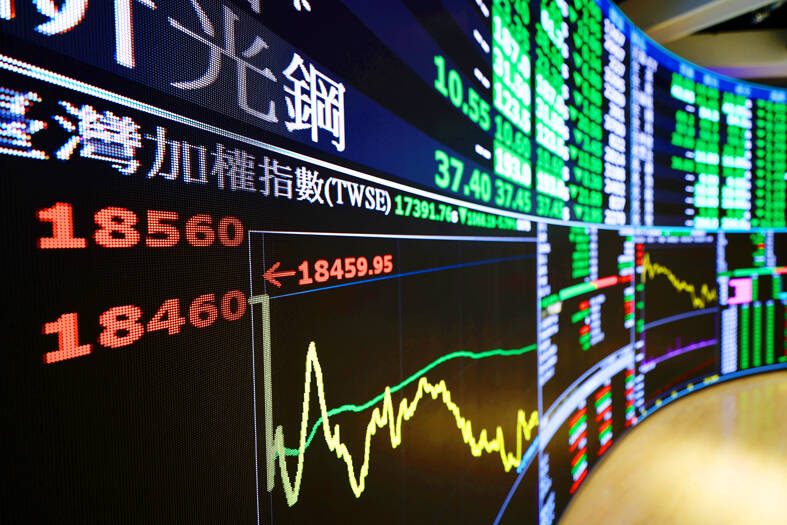The number of small retail investors increased 2.08 percent in the first quarter of this year from the previous quarter, suggesting they intend to hold or even buy the dip, despite facing a correction on the local stock market.
The latest data released on Monday by the Taiwan Stock Exchange (TWSE) showed that the number of retail investors with quarterly trading of less than NT$100 million (US$3.08 million) of stocks in the first quarter increased by 106,829 from the previous quarter to 5.23 million, the second-highest level on record.
The highest number of small retail investors, 5.52 million, was recorded in the third quarter of last year, TWSE data showed.

Photo: Ritchie B. Tongo, EPA-EFE
In contrast, the number of retail investors with minimum quarterly trading of NT$500 million in stocks in the first quarter fell 694, or 21 percent, to 2,622, while those with quarterly turnover of NT$100 million to NT$500 million dropped 5,710, or 20.5 percent, to 22,048, the exchange said in a statement.
Last quarter, the number of “big players” and “mid-sized players” fell to their lowest levels since the second quarter of 2023, when figures stood at 2,427 and 20,546 respectively, TWSE data showed.
The retreat came as stocks in Taiwan slumped in the first quarter amid worries about US President Donald Trump’s tariff policy and Chinese start-up DeepSeek’s (深度求索) launch of its less costly artificial intelligence model rattled investors and generated volatile market trading.
During the first quarter, the TAIEX plunged 2,340 points and the total market capitalization of TWSE stocks decreased NT$7.35 trillion, exchange data showed.
Overall, retail investors accounted for 50.8 percent of the market’s turnover of NT$19.91 trillion in the first quarter, down from 52.8 percent in the previous quarter, while foreign institutional investors made up 36.21 percent, also down from 35.04 percent.
Local institutional investors represented the remaining 12.99 percent, up from 12.16 percent the previous quarter, the TWSE said.
The TAIEX yesterday closed 1.96 percent lower at 19,468.
The index has fallen 15.49 percent since the beginning of the year, exchange data showed.

Taiwan’s long-term economic competitiveness will hinge not only on national champions like Taiwan Semiconductor Manufacturing Co. (TSMC, 台積電) but also on the widespread adoption of artificial intelligence (AI) and other emerging technologies, a US-based scholar has said. At a lecture in Taipei on Tuesday, Jeffrey Ding, assistant professor of political science at the George Washington University and author of "Technology and the Rise of Great Powers," argued that historical experience shows that general-purpose technologies (GPTs) — such as electricity, computers and now AI — shape long-term economic advantages through their diffusion across the broader economy. "What really matters is not who pioneers

In a high-security Shenzhen laboratory, Chinese scientists have built what Washington has spent years trying to prevent: a prototype of a machine capable of producing the cutting-edge semiconductor chips that power artificial intelligence (AI), smartphones and weapons central to Western military dominance, Reuters has learned. Completed early this year and undergoing testing, the prototype fills nearly an entire factory floor. It was built by a team of former engineers from Dutch semiconductor giant ASML who reverse-engineered the company’s extreme ultraviolet lithography (EUV) machines, according to two people with knowledge of the project. EUV machines sit at the heart of a technological Cold

TAIWAN VALUE CHAIN: Foxtron is to fully own Luxgen following the transaction and it plans to launch a new electric model, the Foxtron Bria, in Taiwan next year Yulon Motor Co (裕隆汽車) yesterday said that its board of directors approved the disposal of its electric vehicle (EV) unit, Luxgen Motor Co (納智捷汽車), to Foxtron Vehicle Technologies Co (鴻華先進) for NT$787.6 million (US$24.98 million). Foxtron, a half-half joint venture between Yulon affiliate Hua-Chuang Automobile Information Technical Center Co (華創車電) and Hon Hai Precision Industry Co (鴻海精密), expects to wrap up the deal in the first quarter of next year. Foxtron would fully own Luxgen following the transaction, including five car distributing companies, outlets and all employees. The deal is subject to the approval of the Fair Trade Commission, Foxtron said. “Foxtron will be

INFLATION CONSIDERATION: The BOJ governor said that it would ‘keep making appropriate decisions’ and would adjust depending on the economy and prices The Bank of Japan (BOJ) yesterday raised its benchmark interest rate to the highest in 30 years and said more increases are in the pipeline if conditions allow, in a sign of growing conviction that it can attain the stable inflation target it has pursued for more than a decade. Bank of Japan Governor Kazuo Ueda’s policy board increased the rate by 0.2 percentage points to 0.75 percent, in a unanimous decision, the bank said in a statement. The central bank cited the rising likelihood of its economic outlook being realized. The rate change was expected by all 50 economists surveyed by Bloomberg. The